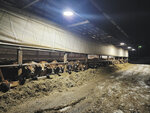

NORWALK, Wis. — When it comes to conservation practices, the Menn family has a deeply rooted history. Harvey and Jackie Menn were presented with the Monroe County Conservation Farmer of the Year award at a banquet Jan. 27 in Sparta.
For Harvey Menn, he is simply following the legacy laid before him.
“Dad bought the farm in 1952, and he got the same award that year,” Menn said. “He was farming with my grandfather prior to that, so my grandfather was involved in conservation as well.”
The farm originated when Menn’s ancestors homesteaded land in 1854. Today, Lawn View Farm consists of 250 owned and rented acres and 90 Jersey cows.
The Menns have raised four children, Kayla, Jenna, Ryan and Kyle, on the organic farm. Jackie said the kids have all been contributors to the farm’s success.
Menn graduated from college in 1987 and worked for his dad for three years. In 1988, he and Jackie married and started taking over the operation. They purchased the farm from his dad in 1990.
The conservation work began with Menn’s grandfather in the 1940s. At that time, the Civilian Conservation Corps, a government work relief organization, camped in the same valley in which the Menn farm is located. The crew planted the hillside of trees that overlooks the Menns’ farm.
The organization also built some of the drop structures on the property. These were designed to prevent gulleys from forming when water ran down the steep, grassy hills.
Over the years, Menn’s father introduced other conservation practices. In 1959, a dam was built on the farm to help with the watershed. The dam was rebuilt in 2015 when its galvanized tube had rusted and is still working today.
Throughout the generations, the county Natural Resources Conservation Service office has helped the Menns implement practices. The Environmental Quality Incentives Program has several projects with monetary incentives. The Menns have completed projects for stream bank improvements and forest management, installed a filter bed in the cow yard, planted wildflowers and enhanced wildlife habitat.
“We’ve done basically everything possible within this program,” Menn said. “We had yet to establish much for wildlife habitat. To address this, Kyle took on the project of building a bat house.”
The local high school got involved when students from Brookwood built the lunkers that improved the stream bank. The wooden structures provide trout protection within the stream bank and, as a requirement of the program, give public access to fish the water.
Menn’s father introduced strip cropping the year he bought the farm from his grandfather and won the conservation award. Menn has continued the practice and credits much of the soil health to maintaining the strips.
“Strip cropping is huge,” Menn said. “Being organic, we have to be very conscientious about soil erosion.”
The Menns have noticed a difference between the land they have maintained for generations and the land they have rented. When strip cropping is not maintained properly, soil health is noticeably depleted, Menn said.
The transition to organic started in 2006, and the Menns shipped their first organic milk in 2009. At that time, they set up 22 acres for rotational grazing, creating 11 paddocks and a perimeter fence around the lot. While many factors made them transition to organic, one of the biggest reasons was the sustainability of the soil.
“When the soil goes, it’s gone,” Menn said. “You have to maintain it and keep it there for the next generation.”
The Menns’ youngest son, Kyle, is attending the Farm and Industry Short Course in River Falls. Kyle aims to continue the dairy but is too young to decide, Jackie said.
Menn plans to continue the conservation work that his ancestors began many years ago. This year, they are slated to participate in a program that closes the manure pit that Menn’s father built in 1971 since it is no longer operational or up to code.
They also plan to reseed pasture ground to promote the growth of legumes and natural grasses and will continue the annual practice of mechanically cutting back any noxious weeds.
Incorporating conservation practices is not a one-time event but a way of life for the Menns. Every task on the farm takes into consideration how to best conserve or improve the land that has been entrusted to them. Conservation is a tradition that has been passed down through the generations and one that will be carried into their farm’s future.
Comments
No comments on this item Please log in to comment by clicking here